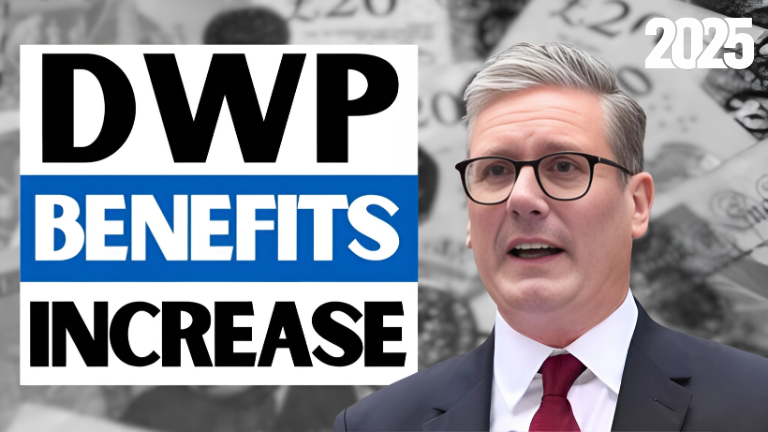Getting your DWP benefit money on time matters more than anything when you’re counting on it to cover basic needs. The Department for Work and Pensions has introduced important changes to how they handle payments during bank holidays across the UK.
These changes affect millions of people who depend on government support every month. Understanding these new rules can help you plan better and avoid financial stress during holiday periods.
How Bank Holiday Payment Changes Actually Work
The government has completely redesigned how benefit payments work during public holidays. Instead of making people wait extra days, they now send money early when regular payment dates fall on bank holidays.
This system helps ensure families don’t run out of cash when banks and government offices close. The DWP and HMRC both follow the same early payment approach to keep things simple.
Which Benefits Get Early Payments
Universal Credit recipients see the biggest impact from these holiday schedule changes. Your monthly payment arrives several days early if your normal date lands on a bank holiday.
Child Benefit families also benefit from this new system, especially during longer holiday periods. The same early payment rule applies to State Pension, Personal Independence Payment, and Carer’s Allowance.
The Easter 2025 Payment Example
During Easter 2025, payments normally due on Good Friday or Easter Monday arrived early. Instead of waiting until April 18th or 21st, recipients got their money on Thursday, April 17th.
This early payment system prevented thousands of families from struggling over the long weekend. The DWP confirmed this happens automatically without any need to apply or request changes.
Understanding Your New Payment Schedule
Payment timing depends on which day your benefit normally arrives each month. The government moves all holiday payments to the last working day before the bank holiday starts.
Most people find this system much better than the old approach of waiting extra days. However, you need to budget carefully because your next payment will come slightly later than usual.
Universal Credit Monthly Payments
Universal Credit gets paid on the same date each month, making it easier to plan. When that date hits a bank holiday, your money comes on the previous working day instead.
For example, if your normal payment date is the 21st and that falls on Easter Monday, you’ll get paid on the 17th. This automatic change happens without any action needed from you.
Weekly and Four-Weekly Benefits
Child Benefit and Carer’s Allowance follow different payment patterns but use the same holiday rules. Weekly payments move to the Friday before if Monday is a bank holiday.
State Pension payments happen every four weeks based on your National Insurance number. The day you normally get paid determines which weekday your pension arrives.
Essential Planning Tips for Holiday Periods
Smart budgeting becomes crucial when payments arrive early during bank holidays. Getting money sooner might feel nice, but the gap until your next payment will be longer.
Many families struggle with this extended wait between payments after holidays. Planning ahead helps you stretch your money properly through these longer periods.
Before Bank Holiday Weekends
Check your payment schedule at least one week before any major holiday. Log into your Universal Credit account or check your award letter to confirm dates.
Buy essential items like food and toiletries before the early payment arrives. This prevents overspending when you first receive the extra money in your account.
Managing Extended Gaps
The time between your early holiday payment and the next regular one will be longer. Create a daily spending limit to make sure your money lasts the full period.
Some people find it helpful to immediately set aside money for bills and essentials. This prevents accidentally spending rent money or utility payments during the holiday period.
What to Do When Payments Don’t Arrive
Missing payments cause immediate stress, especially when you’re depending on that money for basic needs. The first step is always checking your bank account carefully for any pending transactions.
Sometimes payments take an extra day to clear through your bank’s system. Contact your bank first before assuming the DWP or HMRC made an error with your payment.
Checking Your Payment Status
Look at your most recent award notice to confirm the exact payment date. During holiday periods, this date might have changed from your usual schedule.
Universal Credit users can check their online account for updates about payment timing. Other benefits require calling the relevant helpline to check payment status.
Getting Help with Missing Money
Contact the DWP helpline immediately if your payment hasn’t arrived by the expected date. Have your National Insurance number ready along with your recent award letter.
Phone lines get very busy after bank holidays, so try calling early in the morning. You can also use online chat services for Universal Credit if available.
Recent Benefit Amount Increases
Benefit rates increased by 1.7% in April 2025, giving recipients slightly more money each month. This increase applies to most DWP benefits including Universal Credit and Child Benefit.
State Pension saw a larger increase of 4.1% under the government’s triple lock guarantee. These higher amounts started appearing in April payments automatically.
Universal Credit New Rates
Single Universal Credit recipients over 25 now receive around £400.14 per month. This represents an increase from the previous rate of £393.45 monthly.
The government also reduced the maximum deduction rate from 25% to 15% for debt repayments. This change saves affected households approximately £420 per year.
State Pension Improvements
The full new State Pension now pays £230.25 per week, up from £221.20 previously. Basic State Pension recipients get around £176.45 weekly under the new rates.
These increases help pensioners cope with rising living costs and inflation pressures. The triple lock system ensures pensions keep pace with wages, prices, or a minimum 2.5% increase.
Preparing for Future Bank Holidays
May bank holidays and summer holidays will follow the same early payment pattern. Mark these dates on your calendar and plan your budget accordingly for each holiday period.
Christmas and New Year typically create the longest gaps between payments. Start saving small amounts throughout the year to help cover these extended periods.
Using Technology to Stay Updated
Download the GOV.UK app or bookmark the DWP payment dates page. These resources provide up-to-date information about any changes to your payment schedule.
Set up phone alerts or calendar reminders for upcoming bank holidays. This helps you remember to check for any payment date changes in advance.
Building Emergency Savings
Even small amounts saved regularly can help during payment gaps caused by bank holidays. Try saving £5-10 from each payment if possible to build a small cushion.
Credit unions and community savings groups offer safe places to save small amounts. These local organizations often provide better support than traditional banks for people on benefits.
Frequently Asked Questions
Q: Do I need to apply for early holiday payments? No, the DWP and HMRC automatically adjust payment dates when they fall on bank holidays.
Q: Will I get extra money during bank holidays? No, you receive the same amount, just delivered on an earlier date.
Q: What if my bank holiday payment doesn’t arrive early? Check your bank account first, then contact the relevant helpline if the money is missing.
Q: How long will the gap be until my next payment? The gap will be a few days longer than usual since your payment came early.
Q: Do all benefits follow the same holiday payment rules? Yes, both DWP and HMRC use the same system of paying on the last working day before bank holidays.
Q: Can I change my payment date to avoid holiday disruptions? Generally no, payment dates are set based on when you first claimed your benefit.
Q: What happens during Christmas and New Year holidays? The same early payment rules apply, but the gaps between payments may be longer.
Q: Should I budget differently during bank holiday periods? Yes, plan carefully since the time until your next payment will be extended.
Q: Where can I check my exact payment dates? Use your Universal Credit online account, check your award letter, or contact the relevant helpline.
Q: Do Scottish and Welsh bank holidays affect payment dates? Yes, regional bank holidays in Scotland, Wales, and Northern Ireland also trigger early payments.

